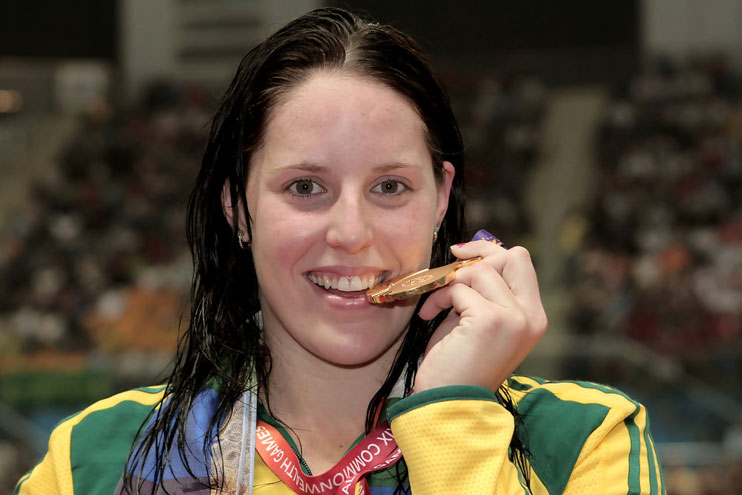
On the 10-year anniversary of the Delhi 2010 Commonwealth Games, Ian Hanson caught up with swimming superstar Alicia Coutts to reflect on her outstanding five gold medal haul from the Games in India.
It is enlightening to hear champion swimmer Alicia Coutts dissect just how she managed to win five gold medals from five events at her first Commonwealth Games in Delhi in 2010.
Coutts won three individual gold medals in the 200m individual medley, the 100m freestyle and 100m butterfly events, before adding her fourth and fifth golds with two relay victories to complete her perfect week in the pool.
But this is a story not of times and records or opponents, but an honest and truthful and at times inspiring account of just how she went about delivering the goods – and against the odds.
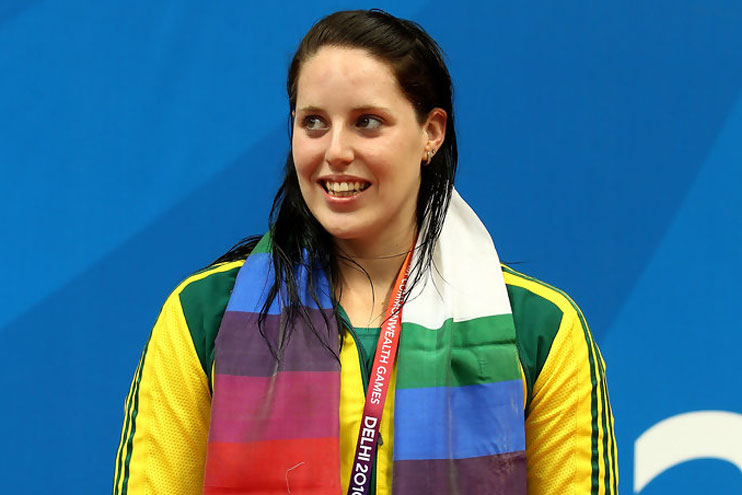
Alicia Coutts on the podium in Delhi, a place she would be often. (CGA Archives)
Remembering the Delhi 2010 Commonwealth Games were no ordinary Games.
This was a Games which had been immersed in turmoil long before the first heats were swum, that would be, by far, the most challenging Games for so many and for so many reasons certainly far from perfect.
But decisions agreed on between Coutts and her young coach John Fowlie would ensure the 23-year-old Queenslander now based at the Australian Institute of Sport (AIS) in Canberra was in the perfect mindset to handle anything Delhi could toss at her.
There was no talk of medals, no talk of times, no talk of expectations.
It was a case of going with the flow, not sweating the small stuff or the big stuff for that matter, especially after the Australian team booked into the Village only to find a massive construction site hole two stories deep right next door to their apartments with just thin plastic tape surrounding it.
And with washing machines precariously placed on their balconies, balconies without any railings.
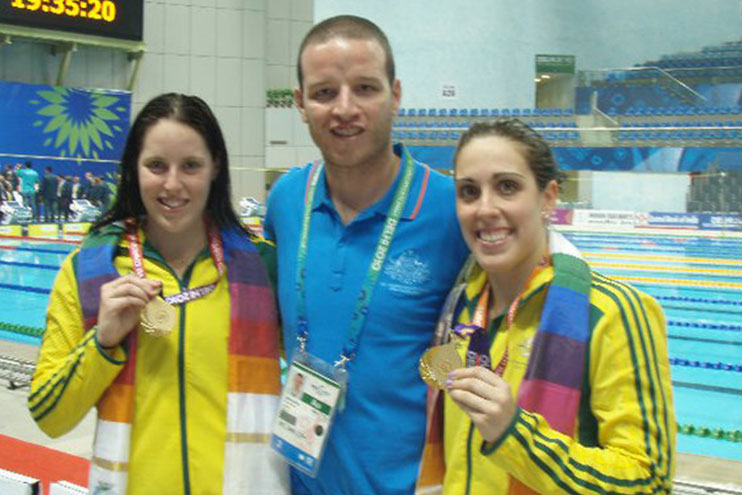
Alicia Coutts with coach John Fowlie and teammate Felicity Galvez. (CGA Archives)
The plan almost came undone on the opening night of the meet from a bout of nerves that caused tears before Coutts opened her account in an Australian 1-2 with Emily Seebohm.
Seebohm would have an outstanding meet herself, finishing with eight medals from Delhi including three gold medals, but in the 200m IM it was a close second behind Coutts.
The victory started the Coutts gold rush, but it included a “Stephen Bradbury moment” to become the ninth Australian to win the blue riband 100m freestyle event, joining names like Dawn Fraser, Jodie Henry and Sonia Gray before her.
And winning the 100m butterfly, an event she didn’t originally qualify for after finishing fourth at the Australian Trials leading into the Games.
They were challenging times all round, but they were times Alicia Coutts took head on in a busy daily schedule of racing fuelled by plates of village pizza and pasta as she guzzled down glasses of Imodium to control the dreaded ‘Delhi Belly’, and with just 30 minutes of down-time between heats and finals and bus trips to and from the pool as troops with machine guns lined the streets.
But despite all the challenges and after Coutts had finished fifth in her one and only swim at the Beijing 2008 Olympics, she was quick to acknowledge the Games in India were a significant moment in her career in the pool.
“I can honestly say that when I look back at Delhi it was really the start of my international swimming career,” Coutts said.
“I really think Delhi set me up for London [2012 Olympics]… I had that experience under my belt, I had done the international competition… [Delhi 2010] gave me a real security.
“I had been in that environment, not as high pressure, but it was really important as an athlete to have experienced that.”
The now retired five-time Olympic medallist reflects positively on how the Commonwealth Games shaped the careers of not only her own but also many before her and many following her.
“I think that’s what I love about the Commonwealth Games… to me it felt like a mini Olympics, there is the Village and the vibe.
It is a little less stressful but still such an amazing competition to have especially as a stepping stone for people when they are getting on their first teams and then to make it to the Olympics.”
“The biggest thing for me was that John and I really didn’t focus on the things that were out of our control – we didn’t sweat the small stuff,” Coutts said.
“It was a very challenging environment in more ways than one. A lot of people were sick, you couldn’t eat certain foods in the Village.
“You had to steer clear of water or anything that had been washed in water so salads were out of the question.
“I lived on pasta and pizza and Imodium every day in the Village and I still had gastric the whole time.
“I’m sure a lot of other people were in the same boat but it was also something that definitely toughened a lot of athletes up.
“It definitely proved that you could never go into an Olympics or a Commonwealth Games with an expectation of how things are going to be and how the Village is going to be.
“There were so many things that were just crazy about Delhi and I do remember looking back and seeing photos come up Facebook memories of me sitting on the bus on the way to the pool having a selfie and there’s a guy behind us on the street standing there with a massive machine gun… it was certainly a different time.”
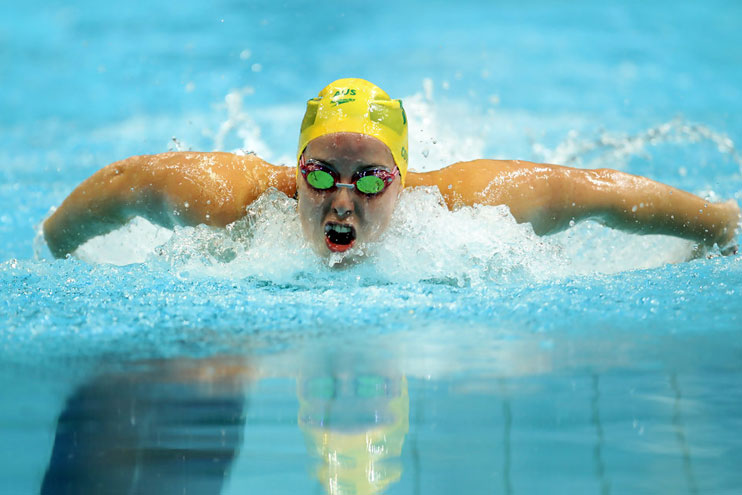
Alicia Coutts in action in Delhi. (CGA Archives)
And the plan?
“John just said ‘get out there and see how you go’,” Coutts recalled.
“After that first gold medal in the 200IM it was similar to what would happen two years later in London at the 2012 Olympics… things just snowballed from there.”
Coutts would go on to win five medals in London – one gold, three silver and a bronze.
“I think I always had to have that mentality of “whatever happens happens?,” Coutts said.
“The moment that I really put that pressure on myself of people expecting me to win a gold medal, others expecting me to do this and do this time.
“That’s when things start to fall apart.
“So I always liked to go into a meet with that mentality of ‘I can only do what I can do on the day and we’ll see what happens’.”
But like all great plans there were a few little hiccups along the way, such as when the curtain finally went up for the opening night as Alicia prepared for her tilt at the 200IM crown, a moment when Fowlie turned from coach to psychologist and source to confide in.
“There were times when I went up to race like in Delhi for the 200IM, when I was so nervous… I was actually in tears,” Coutts recalled.
“He knew when I needed to be calmed down or if I needed to go to a quiet corner and just have a quiet chat.
“He was always there and he would ask, ‘have you done this before?’… ‘You have been nervous before and how did you go?’
“He would reassure me that I had done all the work that needed to be done to achieve what I needed to do on the day.
“John was certainly my mental coach as well as my swimming coach.”
And the result was her first gold medal in a new Commonwealth Games record time of 2:09.70 – some three seconds faster than Stephanie Rice had swum in Melbourne four years earlier and the first Australian female swimmer to go under the 2:10 barrier for the event.
It was the event Rice had won and Coutts finished fifth in Beijing in 2008 and the event she would take the silver in two years later at the London Olympics.
It was of course followed by a “what did I tell you?” moment when the coach met the swimmer after the race.
“There was hardly any turn around between heats and finals so literally we swam the heats and then came back to the Village for a bite to eat and then we had maybe 30 minutes before we had to get ready and get back on the bus and go back to the pool for semis and finals,” Coutts said.
“The turn around was really tiring and exhausting… but I just kept going and doing the best job that I could.
“I just pushed on and gave every race, everything that I had… and I was not expecting five gold medals that’s for sure.”
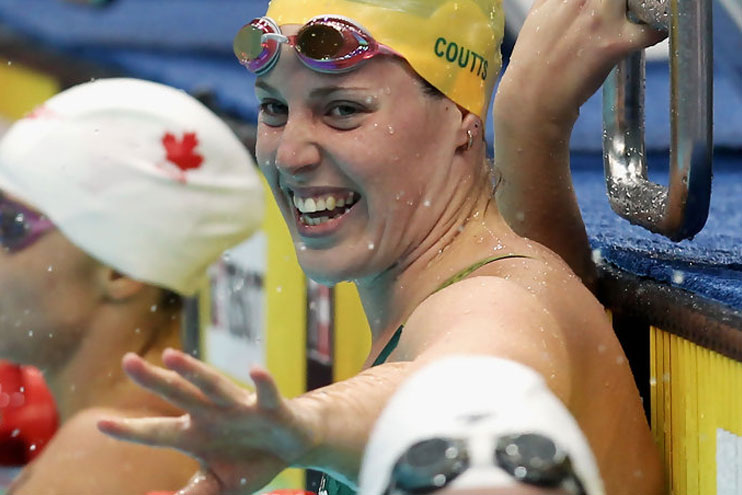
Alicia Coutts en route to winning five gold medals. (CGA Archives)
It proved to be a golden Games for the Queenslander, becoming just the seventh Australian at the time to win at least five gold medals at a single Commonwealth Games.
“The 200 IM was the event we were most focused on and the one that I had the best chance of winning but when I think back to the Trials earlier that year I actually finished fourth in the 100m butterfly (behind Stephanie Rice, Felicity Galvez and Jessicah Schipper) so I was never expecting to be on the team for the 100 ‘fly, which I only started doing earlier in that year,” Coutts said.
“I knew that third spot was up for grabs when we raced at the Pan Pacs in Irvine, California in August in the lead up to the Games.
“I remember going to Pan Pacs and actually winning bronze (behind US girls Dana Volmer and Christina Magnussen) and I think that was the real moment I thought to myself ‘Oh Wow..maybe I can win medals internationally’.
“That swim gave me real confidence that I didn’t have before and it was a real light bulb moment for me as a swimmer myself that winning an international medal wasn’t going to be as hard as I thought it was going to be.
“So looking back and getting that bronze at the Pan Pacs and being the fastest 100m butterflyer for Australia which gave me that spot at the Commonwealth Games which I hadn’t expected and hadn’t previously earned.
“It turned out to be a big bonus for me and it also helped my 200IM immensely.”
The sequence of events for Coutts continued, this time across the 100m freestyle event, an event Australian women had won at the previous two Games.
“I also didn’t expect to win the 100m freestyle, just that all the dominos fell down and it was a real Stephen Bradbury moment,” Coutts said.
“There was no one real dominant 100 freestyler at that point in time… I was very lucky that I just happened to be there at the right place at the right time and in good form.
“English girl Fran Halsall was the favourite and I knew she was quite sick with gastro as well and to be truthful I was just the lucky one on the day.”
And then came the relays with Coutts playing a vital role in the 4x100m freestyle relay with Emily Seebohm, Felicity Galvez and Marieke Guehrer setting a new Games record and maintaining a streak that started in Kuala Lumpur 1998 Games and has continued through Glasgow 2014 Games and most recently at the Gold Coast 2018 Games.
And of course, Coutts would be part of the team that won gold in London, a dynasty that has continued to see the Australian girls dominate this premier relay with its world record breaking feats in London, Glasgow, Rio 2016 Olympics and the Gold Coast.
The medley relay with Seebohm, Schipper and Leisel Jones would see the girls just shy of the Games record which was also the world record set by the Aussie foursome of Sophie Edington, Schipper, Jones and Libby Trickett in Melbourne in 2006.
“I always loved being part of the relays, they are so much fun, especially when you win or get a medal,” Coutts said.
“You get to share that with those other girls… it’s like there is no pressure, no stress, it was just fun and we let it all just happen.”
Alicia Coutts is now happily married with two young children, living in Canberra and returning to the workforce, and like most finding it hard to believe that Delhi was 10 years ago.
But happy to reflect on a Games that set her up for bigger and better things in London, knowing that people don’t really know what goes into winning one gold medal, let alone five.
“There’s a lot more goes into a performance than just rocking up on the day and competing and there is so much that goes on behind the scenes that people are not aware of,” Coutts said.
And as tough as Delhi was, the smile on Alicia’s face when she carried the Australian flag in the Closing Ceremony was priceless!
